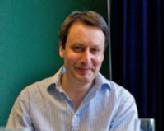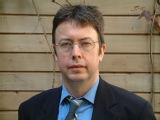Royal Society Fellowships for two Warwick Professors
On 2 May 2013, two Warwick Professors were made Fellows of the Royal Society. Keith Ball from the Department of Mathematics and Gareth Roberts from the Department of Statistics were elected through a peer review process, selected from more than 700 candidates, on the basis of excellence in science.
Fellows are invited to fulfil a range of responsibilities for the Society on a voluntary basis. Many are members of awards or grants committees, editorial boards, research panels or other bodies that oversee the work of the Royal Society.
Professor Keith Ball FRS FRSE
Keith is Professor of Mathematics at Warwick and Scientific Director of the International Centre for Mathematical Sciences (ICMS) in Edinburgh. He obtained his BA (1982) and PhD (1987) in Mathematics from Cambridge University and after working for several years at Texas A&M University became a lecturer at UCL in 1990. He was promoted to a professorship there in 1996 and to the Astor Professorship in 2007. He has held visiting positions at Microsoft Research, the Institut Henri Poincaré and the University of Michigan (Ann Arbor). He was awarded a Whitehead Prize by the London Mathematical Society in 1992 and held a Royal Society Leverhulme Senior Research Fellowship from 2003 to 2004. Professor Ball’s research is in the fields of high-dimensional geometry and probability/information theory. Among other things, he and his collaborators established an analogue of the Second Law of Thermodynamics for the Central Limit Theorem of probability, thereby solving a problem that had been open since the 1950s. He is also the author of 'Strange Curves, Counting Rabbits, & Other Mathematical Explorations', a popular mathematics book published by Princeton University Press. Read more about Keith's Fellowship of the Royal Society.
Last month, Keith was also elected a Fellow of The Royal Society of Edinburgh. Fellows are elected following a rigorous examination of achievements in their relevant fields.
Keith said:
I am delighted to be honoured with fellowships of the Royal Societies and am very happy for Gareth."
Professor Gareth Roberts FRS
 Gareth Roberts, Director of the Centre for Research in Statistical Methodology (CRiSM) at Warwick, is distinguished for his work spanning Applied Probability, Bayesian Statistics and Computational Statistics. He has made fundamental contributions to the theory, methodology and application of Markov Chain Monte Carlo and related methods in Statistics. Gareth developed crucial convergence and stability theory, constructed a theory of optimal scaling for Metropolis-Hastings algorithms, and introduced and explored the theory of adaptive MCMC algorithms. He has made pioneering contributions to infinite dimensional simulation problems and inference in stochastic processes. His work has already found practical application in the study of epidemics such as Avian Influenza and Foot and Mouth disease. Read more about Gareth's Fellowship.
Gareth Roberts, Director of the Centre for Research in Statistical Methodology (CRiSM) at Warwick, is distinguished for his work spanning Applied Probability, Bayesian Statistics and Computational Statistics. He has made fundamental contributions to the theory, methodology and application of Markov Chain Monte Carlo and related methods in Statistics. Gareth developed crucial convergence and stability theory, constructed a theory of optimal scaling for Metropolis-Hastings algorithms, and introduced and explored the theory of adaptive MCMC algorithms. He has made pioneering contributions to infinite dimensional simulation problems and inference in stochastic processes. His work has already found practical application in the study of epidemics such as Avian Influenza and Foot and Mouth disease. Read more about Gareth's Fellowship.
Gareth said:
I am thrilled and honoured by award."
About the Royal Society
The Royal Society is a self-governing Fellowship of many of the world’s most distinguished scientists drawn from all areas of science, engineering, and medicine. The Society’s fundamental purpose is to recognise, promote, and support excellence in science and to encourage the development and use of science for the benefit of humanity. The Society has played a part in some of the most fundamental, significant, and life-changing discoveries in scientific history and Royal Society scientists continue to make outstanding contributions to science in many research areas.
Find out more about the Royal Society.
About the Royal Society of Edinbugh
The RSE’s mission is the advancement of learning and useful knowledge and since its establishment in 1783 it has made a major contribution to Scottish Society through its Fellows. It is unique in Britain and distinctive internationally in the breadth of its Fellowship, which ranges across the sciences, medicine, engineering, the social sciences, arts, humanities, business and public service. Amongst its wide range of activities it provides: independent advice to Government and Parliament; research and enterprise Fellowships; education programmes for young people; and conferences and events aimed at both public engagement and specialists.
Find out more about the Royal Society of Edinburgh.
